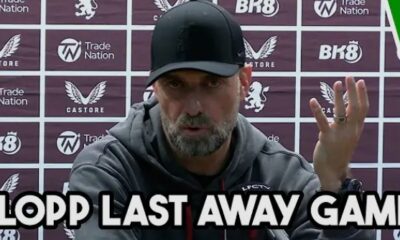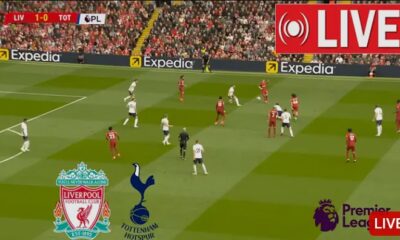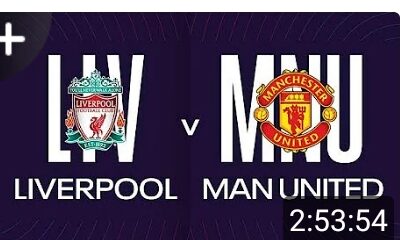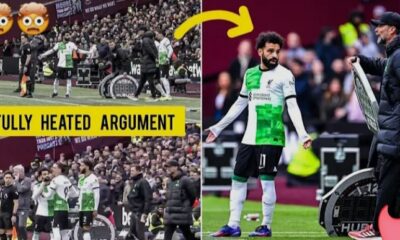Liverpool
When you hear lies you get angry’ – Liverpool man refused to play after broken promises and controversial transfer

 When you hear lies you get angry’ – Liverpool man refused to play after broken promises and controversial transfer
When you hear lies you get angry’ – Liverpool man refused to play after broken promises and controversial transfer
Javier Mascherano was a force of nature during his time at Liverpool and his arrival and departure remain among the Reds’ most controversial transfers of all time.
Liverpool fans have always loved flair players who knock them out of their seats with a shoulder drop and hip jerk.
But many Anfield fans have also always enjoyed a tough case in midfield, a nark in the middle of the park who sets up, shakes a few goals and makes it clear you can’t take liberties.
Tommy Smith, Graeme Souness, Jimmy Case, Steve McMahon, Steven Gerrard and Dietmar Hamann have become big favorites in part due to their physicality and ability to shield the defence, with Fabinho currently wearing that coat at Jurgen’s Liverpool side Klopp.
The Brazilian’s arrival in the summer of 2018 is rightly seen as one of the most significant moments of the German manager’s tenure at Anfield, becoming the ‘beacon’ and linchpin in front of the defence, providing the platform on which flair players were able to shine. before him and once again make the Reds one of the most feared teams in Europe.

The acquisition of Fabinho is considered fundamental to the development of the Klopp era, because the role of the defensive midfielder is undeniably important in the modern game, but also because Liverpool had been absent from this position for almost a decade. . The acquisition of Fabinho is considered fundamental to the development of the Klopp era, because the role of the defensive midfielder is undeniably important in the modern game, but also because Liverpool had been absent from this position for almost a decade. .
Not since Javier Mascherano the Reds boasted of having a truly exceptional player in that area of the pitch and either side of two of Liverpool’s most controversial transfers of the Premier League era was the Argentine the thorn in the side. backbone of one of the two most promising. but ultimately dissatisfied eras of most clubs.
‘El Jefecito’, or ‘the little chef’ as he was known, was apparently always destined for greatness, his skills even as a youngster ensured him to be in the unusual position of 19 years old in July 2003, making his international debut to be given before he played his first match for River Plate in the Argentine Clausura League.
After joining Brazilian club Corinthians in the summer of 2005 under a complicated third-party ownership deal, he soon suffered the setback of a stress fracture in his foot, but recovered in time to play every minute of Argentina’s run to the 2006 World Cup quarter-final, where they played hosts Germany lost on penalties.
The 22-year-old’s skills were starting to attract the attention of some of Europe’s top clubs. So there was a big surprise at the end of this summer’s transfer window when Mascherano – who had previously expressed interest in a move to Real Madrid or Barcelona. – and other youngsters, Argentinian Carlos Tevez, a striker, joined former West Ham United for an ‘undisclosed fee’. It was to become one of the most controversial deals in Premier League history as it quickly emerged that the sellers were not Corinthians but four different mutual funds.

The first was Media Sports Investments (MSI), run by so-called “super agent” Kia Joorabchian, who has been involved with Mascherano since his move from River Plate to Corinthians, which came about following an agreement between MSI and the Brazilian club to which the OM company would have given them a say in the future of the club in exchange for a financial investment.
Mascherano was also part-owned by Just Sports Incorporated, while Tevez was also part-owned by two clubs, Global Soccer Agencies and Mystere Services Limited (all represented by Joorabchian), which made up the quartet.
It was English football’s first real experience of third-party player ownership, a practice more common in South America but not allowed in the Premier League at the time and still is not (it has banned worldwide in 2015).
The lack of transparency surrounding the young Argentinian couple’s arrival in east London – the length of the players’ contracts and transfer fees were not disclosed – raised suspicion almost immediately and there would ultimately be serious repercussions for the Hammers. The following March, the Premier League accused them of breaching third-party ownership rules and acting in good faith, fining them a record £5.5million. In May that year, Tevez scored a winning goal against new champions Manchester United (whom he then signed for that summer) on the final day of the season, keeping West Ham’s status in the Premier League. at the expense of Sheffield United and the Blades for legal reasons to take action, with the two clubs eventually agreeing to a £20 million out-of-court settlement.
By the time Tevez scored his last goal for West Ham at Old Trafford, Mascherano was already on loan at Anfield and while the machinations surrounding the midfielder’s move weren’t as heartbreaking as Tevez’s, his subsequent move to Liverpool proved arduous and infuriated Rafa Benitez, who accused the Premier League of throwing double standards over Manchester United, almost a year before his infamous ‘facts’ speech in January 2009.
After the headlines of his arrival, Mascherano struggled to get regular playing time for the Hammers, making only seven brief appearances and sparking rumors of alleged financial clauses linked to his actual playing time, and before the fall 2006, Argentine coach Alfio Basile would hope Mascherano leaves West Ham “as soon as possible” and “I hope for the love of God that Mascherano can go to Juventus”.
In mid-January 2007, Liverpool asked FIFA for special permission to loan out Mascherano as the rules did not allow any player to play for more than two clubs between 1 July and 30 June the following year – he had already played for Corinthians and West Ham during that time – and it was granted on the last day of the month, but despite Liverpool sending their registration details before the midnight transfer deadline, the Premier League did not did not immediately announce whether it would allow him to play for the Reds and said he would “take the time to settle for the proposed rules”.

Liverpool included him in their Champions League squad on February 10 and handed him the number 20 shirt. Ten days later, the Premier League formally approved the loan deal, meaning Mascherano four days later in a 4-0 home win could make his debut against Sheffield United in which Robbie Fowler scored his last two goals for the Reds.
The Argentine quickly established himself as a key figure in Benitez’s side and was the ideal replacement for Dietmar Hamann, who left him last summer in March, and Xabi Alonso, who marveled of his remarkable tactical maturity, saying: “He keeps a cool head on the pitch. He analyzes and thinks about the game at all times.”
Mascherano’s tenacity in tackling, effective ball handling and ability to inspire those around him quickly made him one of the best names on the team’s roster and, in just his 11th game, arguably the best Liverpool player in the Champions League final loss to AC Milan. in Athens his 78th-minute substitution for Peter Crouch, who came on, arguably played a part in Pippo Inzaghi’s decisive second goal four minutes later that effectively sealed Italy’s triumph. Despite the disappointment in the Greek capital, it was clear that Mascherano was one of the players Benitez planned to develop his squad alongside new signings Fernando Torres, Yossi Benayoun and Ryan Babel, but it wasn’t until the following February – a year on from his first loan spell – that Mascherano’s £18.6m permanent move to Anfield was complete and the deal could be done outside the winter window as the player was unsigned in another club.
By this stage, Tevez had long since completed his seemingly straightforward move to Manchester United, despite the problems associated with his first move to West Ham and the ripple effect of his last game-saving Premier League goal for the Irons, which infuriated an anger. response from Rafa Benitez.
In an impassioned exclusive interview with ECHO at the time, Benitez said: “I would like to ask the Premier League a few questions. How can a player with a signed contract be treated like this?
“He has a clear document but the Premier League prefers to take someone else’s word for it who made a mistake. I know there were allegations against Liverpool in the hearing which were unbelievable. How can this be allowed?
“Then I would like to ask the Premier League why Liverpool are still playing most away games after an international break with an early kick-off?
“We had more than just the top clubs last season and we already have four to prepare for this season.
“Then I would like to ask the Premier League, why was it so difficult for Liverpool to sign Javier Mascherano when we had to wait a long time for the paperwork, but so easy for Carlos Tevez to join Manchester United? “It will be very difficult for us to win the Premier League because the other teams are so strong, but I want our fans to know that despite the disadvantages we have, we will fight until the end.
“We’re going to fight to deal with our tougher kick-off moments and all the other decisions that go against us.”
This same kind of siege mentality was evident in Mascherano a month after he became a Liverpool regular when he was sent off at Manchester United.
Furious at the harsh and unpunished treatment Fernando Torres received from Rio Ferdinand and Nemanja Vidic in his stellar first season at Anfield, the Argentine’s excitement boiled over into his insistent questioning of referee Steve Bennett, who was evidently at the stream of media narrative on Backchatting with officials. after a high-profile case involving Chelsea’s Ashley Cole a few days earlier made an example of the Liverpool man and gave him his marching orders for persistent dissent.
Nonetheless, Mascherano’s skills again helped Liverpool reach the commercial end of the Champions League before losing to Chelsea after extra time in the semi-finals and the following season – aided by a rejuvenated Xabi Alonso alongside him in midfield. , skipper Steven Gerrard allowed one more playing an influential forward role alongside Torres – he was a key factor in Liverpool’s most credible title challenge in nearly two decades.
The Reds amassed their highest number of points of the Premier League era – 86, which would have been enough in some previous seasons to become champions – lost just two league games all season and went on to win again reached the quarter-finals of the Champions League.
-
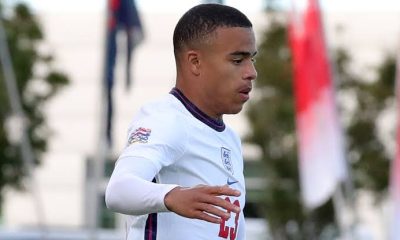
 Manchester United10 months ago
Manchester United10 months agoMason Greenwood Has Confirmed His Departure From England For The white Country’s National Team
-

 Manchester United12 months ago
Manchester United12 months ago‘I pleaded with Him to join Arsenal but He chose Man united over us’: William Saliba confirmed His £45m international teammate have agreed personal terms to join Man united over Arsenal
-
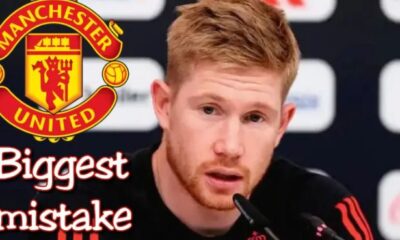
 Manchester United12 months ago
Manchester United12 months ago‘He is making the biggest mistake in his career’: Kelvin De Bruyne CONFIRMED his £50m international teammate have agreed personal terms to join Man united ahead of Man City
-

 Uncategorized10 months ago
Uncategorized10 months agoMan United news LIVE: Glazer takeover price’met,’ Sheikh Jassim reacts, Jadon Sancho swap agreement
-
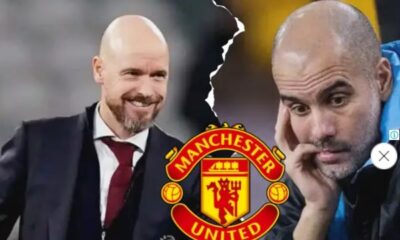
 Manchester United12 months ago
Manchester United12 months agoMan city boss Pep Guardiola is UNHAPPY as €65m European star tells him nobody can stop him from joining Erik Ten Hag’s Man united this season.
-

 Manchester United1 year ago
Manchester United1 year agoCelebration at Old Trafford Qatar’s Sheikh Jassim arrives at Man United to sign the takeover deal (deal 100% done by Fabrizio Romano) unverified.
-

 Manchester United11 months ago
Manchester United11 months agoMonday morning done deal: Man united completed the signing of £50m superstar as potential replacement for Erikson,all paperwork work signed last night,player set to undergo his medical at London Carrington today
-
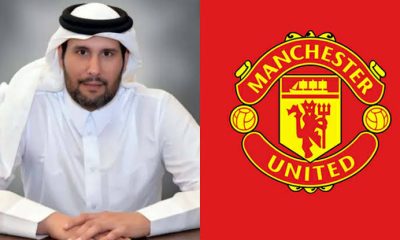
 Manchester United10 months ago
Manchester United10 months agoMan United takeover ‘will happen,’ says Sheikh Jassim, who is willing to pay another £2 billion to complete the deal.



